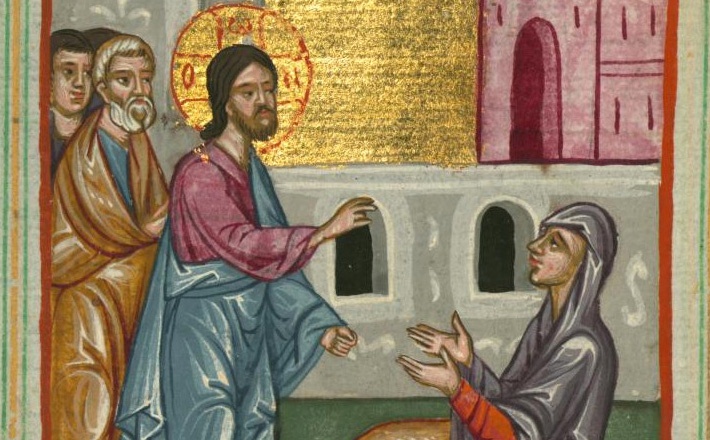
And behold, a Canaanite woman from that region came out and cried, “Have mercy on me, O Lord, Son of David; my daughter is severely possessed by a demon.” But he did not answer her a word. And his disciples came and begged him, saying, “Send her away, for she is crying after us.” He answered, “I was sent only to the lost sheep of the house of Israel.” But she came and knelt before him, saying, “Lord, help me.” And he answered, “It is not fair to take the children’s bread and throw it to the dogs.” She said, “Yes, Lord, yet even the dogs eat the crumbs that fall from their master’s table.” Then Jesus answered her, “O woman, great is your faith! Be it done for you as you desire.” And her daughter was healed instantly.
There is no doubt that this is one of the passages of Scriptures that many find troubling, once they really read it. Jesus calls the Canaanite woman a dog, and calls her daughter, possessed by a demon, a dog. At first sight, this could easily appear to be a very non-politically-correct post. But, even more than that, many Christians would find this post to quote Jesus as saying words that they find offensive as well. So, what is going on? On the one hand, posts like these can remind us that political correctness is a construction found in our current culture which is not necessarily found in other cultures. Does that mean that other cultures need to learn from us? No, absolutely not! Each culture has words and phrases that they find either acceptable or not acceptable. Just because we have difficulties with Jesus’ phrasing does not mean that our culture is right and another culture is wrong.
Having said that, what is Jesus saying? Why would he address her and her daughter as dogs? We have a hint on what this may have meant in that culture from Saint John Chrysostom, a person who was much closer to the time of Jesus than we are. He explains that:
Hear the proud language of the Jews. We be Abraham’s seed, and were never in bondage to any man; John 8:33 and, We be born of God. John 8:41 But not so this woman, rather she calls herself a dog, and them masters; so for this she became a child. What then says Christ? O woman, great is your faith. Matthew 15:28
Yea, therefore did He put her off, that He might proclaim aloud this saying, that He might crown the woman.
Be it unto you even as you will. Now what He says is like this: Your faith indeed is able to effect even greater things than these; nevertheless, Be it unto you even as you will.
This was akin to that voice that said, Let the Heaven be, and it was. Genesis 1:3
And her daughter was made whole from that very hour.
Do you see how this woman too contributed not a little to the healing of her daughter? For to this purpose neither did Christ say, Let your little daughter be made whole, but, Great is your faith, be it unto you even as you will; to teach you that the words were not used at random, nor were they flattering words, but great was the power of her faith.
The certain test, however, and demonstration thereof, He left to the issue of events. Her daughter accordingly was straightway healed.
But mark thou, I pray you, how when the apostles had failed, and had not succeeded, this woman had success. So great a thing is assiduity in prayer. Yea, He had even rather be solicited by us, guilty as we are, for those who belong to us, than by others in our behalf. And yet they had more liberty to speak; but she exhibited much endurance.
So, Chrysostom says that Jesus was deliberately using the Samaritan woman as an example. He knew her strength. He knew how she would react. And, he wanted to show the disciples how her faith rivaled the faith of the Old Testament saints. This was also an example of what became the doctrine of theosis among the Orthodox. For, she showed how coöperation with God yields great results.
The Canaanite woman gives us a true example of faith. She rivals any Pentecostal for what is true faith in the work of the Holy Spirit. More, she reminds us that we were apart from God, estranged from God, even enemies of God. But, because of the work he performed, we now have an entrance into God’s presence. But, she also reminds us that the love of a mother is a sacrificial love, one that is even willing to put up with insults so that her daughter may be saved. If Chrysostom shows how the woman’s faith opened the doors of Paradise, the passage also shows how strong a mother’s love will put up with any insult, any injury, any sacrifice, in order to help her children.
And, that is not a bad lesson for Valentine’s Day, a day on which we remember true love.



Leave a Reply